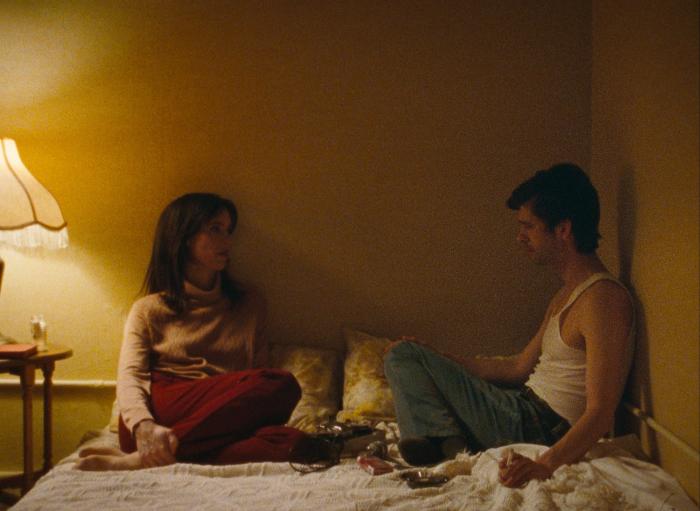By Jason Adams | Film | October 6, 2025

Who here’s a fan of hangout movies? Movies where the plot is secondary to characters just hanging out, having conversations—think My Dinner With Andre or very nearly every Richard Linklater film ever made. (But especially his Before trilogy.) Well if you are a fan, then Passages writer-director Ira Sachs has come up with a honey of a hang-out movie with Peter Hujar’s Day. Starring Ben Whishaw as the eponymous photographer and Rebecca Hall as his good friend, the author Linda Rosenkrantz, this is 76 minutes of heaven—which is to say 76 minutes of hanging out with Ben Whishaw and Rebecca Hall. And who wouldn’t want to hang out with Ben Whishaw and Rebecca Hall? 76 minutes, 76 hours—we’ll take whatever they’ll give us, because what a gift.
In 1974, Linda Rosenkrantz was thinking about writing a book where she would ask her many downtown NYC artist friends to narrate a day in their lives. The previous day, no matter what happened during it—she wanted both the thrills and the tedium; she wanted all of it. That book was unfortunately never realized, but the recordings of her interview with Hujar were indeed dug up decades later, and in 2022 a transcript of them was published in a slim volume. And reading it feels like boarding a time machine to a time and a place most of us have only dreamed of experiencing.
So too the movie. Peter Hujar’s Day brings that recording to life, practically verbatim. As such it’s less of an interview or even a chat between the two friends then it is a monologue that’s delivered by Whishaw, with intermittent interjections from Hall to press him on details or sometimes needle him in the way only good friends can do. But this being cinema what that actually translates to is we’re gifted with 76 minutes of the mellifluous tones of Ben Whishaw speaking and the rapturous visions of Rebecca Hall listening.
And oh, how she listens! They say that learning to listen as an actor is one of the greatest mountains to be climbed, but Rebecca Hall crested that one long ago—watching her watch Whishaw is why the movies were invented. Whenever Sachs holds the camera on her as Whishaw talks about whatever, horny tricks calling him up in the middle of the day, it’s like fireworks—there’s more action happening in the furrow of her brow or the burst of her laughter than there is in ten Marvel movies combined.
It should also be noted that this is not the dulcet sound of Ben Whishaw voicing everybody’s favorite marmalade-lover Paddington the bear, though—this is Ben Whishaw doing a hard, note-perfect New York (by way of New Jersey) accent. So not quite the same, no! But never you mind that because if there’s one thing Ben Whishaw can do it’s deliver even the most purposefully mundane dialogue with wit and precision. His Hujar is sometimes funny, sometimes a frustrating bore and star-f***er, but entirely realized—fully human. When night falls on this day you will feel like you spent it with an actual human being; one that an actor manifested out of thin air. What an astonishing skill to have. Watching a real one do it, be given this sort of room and leeway, is pleasure defined.
Because you know the saying of how you’d watch so-and-so recite the phone book? Peter Hujar’s Day does test that theory’s outer limits. In between the highlights of Hujar’s day—like his detailing of how he met and photographed and didn’t hit it off with Allen Ginsberg the day prior—there’s a lot of secondhand phone conversations with people we don’t know, or him developing film in his dark-room… Rosenkrantz said she wanted it all, and we definitely get it. The highs, the lows, and a lot of life’s middling nothings in between. Patience is required.
Part of what’s fascinating about all of this even in these lulls though is its telescoping out of time and of storytelling—Hujar proves to not be an altogether reliable narrator of his own experience, having to double-back on some details, with certain passages of them never adding up correctly. But it’s his way of remembering what happened, prioritizing what he wants to, and in it you can see a person building a story, a narrative, out of their life in real time.
And from there Sachs zooms us out, imagining his own narrative for Hujar and Rosenkrantz’s experience of that day, the one they spent talking about another day, all of which only truly lives on the other side of a scratchy tape recording that somebody finally found in a box a couple of years ago. Sachs’ frames are square, usually stock-still but exquisitely composed, giving us an unending feast of frames to look upon whether it’s Ben Whishaw wearing really tight jeans or Rebecca Hall’s infinitely fascinating face in profile. Sachs transports us straight to a New York that no longer exists—thanks to the pitch-perfect set design (those ash-trays) and the grainy, skipping film-stock this movie feels like an unearthed time capsule. You can feel the cigarettes staining your fingertips and teeth; the soft fading light falling through the windows on your face. The summoning of ghosts and sensations. A handful of lost moments, miraculously regained. Please take me back!
(Peter Hujar’s Day is currently screening at the New York Film Festival. It hits U.S. theaters on November 7th.)